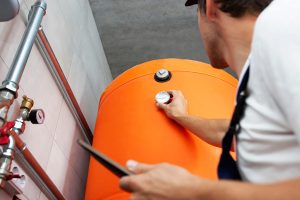Domestic oil boilers play a crucial role in keeping our homes warm and comfortable, especially during the colder months. However, boilers can consume a significant amount of energy, leading to higher costs and environmental impact.
Thankfully, there are several effective measures you can take to increase heating oil boiler efficiency. In this blog post, we’ll share our top tips.
Schedule Your Annual Oil Boiler Service
It’s important to have your boiler serviced by an OFTEC-qualified engineer at least once a year. An oil boiler service is the best way to ensure your home’s heating system is running as efficiently as possible. During the service, our engineers will inspect your boiler and identify any issues that may impact its energy efficiency or safety.
Failing to take care of your boiler inevitably leads to gradual wear and tear. The consequences not only negatively impact boiler performance, but also lead to increased boiler repair costs and a shortened lifespan. By keeping your boiler well maintained, you can proactively avoid these problems, ensuring optimal boiler performance for years ahead.
Read our guide to oil boiler services to find out what to expect and how to prepare for your appointment.
Control Your Thermostat Correctly
If you’re not using your thermostat effectively, you may be wasting energy and spending more on your heating bill. To increase oil fired boiler efficiency, you can adjust your thermostat. Simply lower the temperature a few degrees during winter and maintain a moderate setting.
If you want to take things a step further, install a programmable thermostat. A programmable thermostat can help you save energy by automatically adjusting the temperature of your home, based on your schedule. For instance, if you’re away from home most of the day, set your thermostat to a lower temperature until you return.
Bleed Your Radiators Regularly
Bleeding your radiators is a great way to increase your oil boilers efficiency levels. Air trapped in your radiators can hinder heat distribution, making your boiler work harder to achieve desired temperatures. Bleeding your radiators releases trapped air, allowing them to operate efficiently and evenly distribute heat throughout your home. To ensure optimal performance, we recommend bleeding your radiators at least once a year to keep them in peak condition.
Clean Your Oil Boiler
Regularly cleaning your boiler may not seem like an obvious task, but it offers long-term benefits. Preventing dust buildup in your boiler avoids clogged tubes and pipes, improving performance and reducing heating costs.
To avoid dust buildup on your boiler, take the time to clean its outer housing whenever you clean your home. However, it’s worth noting that you should never attempt to clean the interior of your boiler yourself. Instead, our OFTEC-registered engineers can handle this task during regular servicing.
Consider Upgrading Your Oil Boiler
Consider upgrading to a high-efficiency oil boiler if your current system is outdated. It’s advisable to replace most heating oil boilers when they are over 10 years old. However, if your boiler is in poor condition or not performing optimally, you may need to replace it sooner.
Modern boilers feature advanced technology, such as condensing boilers that extract more heat from the fuel and waste less energy. Although the initial investment may be higher, the long-term energy savings can be significant.
Our team of qualified technicians are always happy to help with any questions you may have. Get in touch today to learn more about increasing oil boiler efficiency or other heating issues.
Alternatively, read our guide to oil boiler problems and solutions.





